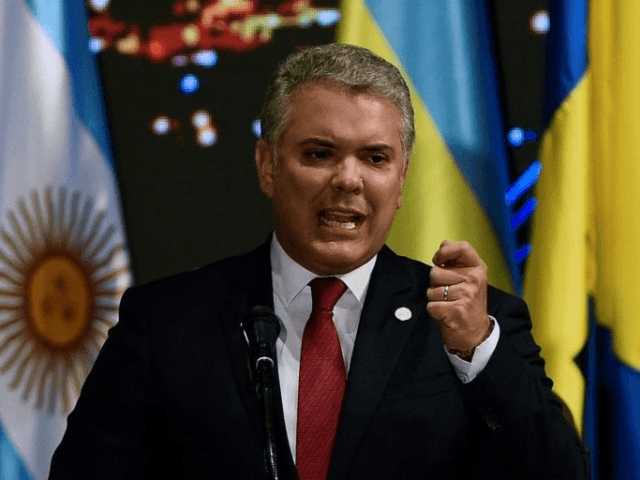A high-ranking terrorist in the Revolutionary Armed Forces of Colombia (FARC) has invested $1.6 million in attempting to assassinate conservative Colombian President Iván Duque, a top police official revealed last week, shortly before the nation’s first-ever leftist president takes power.
The Spanish newswire service EFE cited Jorge Luis Vargas, the director of the Colombian national police, as confirming the conspiracy in remarks on Thursday honoring 36 police officers killed this year by various gangs and terrorist organizations. Vargas said FARC leader “John Mechas” had also spent another nearly $500,000, or two billion Colombian pesos, trying to kill a top national police general and the country’s defense minister, Diego Molano. The total allegedly spent trying to kill Duque amounts to seven billion Colombian pesos.
“We are certain that John Mechas has distributed 7 billion pesos already in [assassination] attempts against the president of the republic, Iván Duque,” Vargas said, according to EFE.
The police information on the activities of the FARC, the National Liberation Army (ELN), and other Marxist terrorist organizations comes to light as Colombia prepares for Duque’s term to end. The next president of the country, scheduled to be inaugurated on August 7, is radical Marxist Gustavo Petro, who himself belonged to the Marxist terrorist group M-19 as a youth. Reports in the country have speculated that Petro may allow the M-19 terrorists to fly their flag at his inauguration ceremony.
The FARC allegedly disbanded following an ill-fated “peace deal” with the Colombian government, signed in 2016, which allowed the FARC to use its cocaine and terrorism financing to establish a political party and granted it uncontested seats in the Colombian Congress. To save face, the Colombian government refers to FARC terrorists who still engage in FARC terrorism as “dissidents,” despite the fact that they continue to operate as the group has done for more than half a century.
FARC “dissidents” celebrated Petro’s election victory in June.
Vargas warned of growing violent activity by the FARC “dissidents,” the ELN, and the Clan del Golfo, a major rival drug-trafficking organization, during the ceremony last week. Prior to that, Vargas gave an interview to the right-leaning Colombian magazine Semana, published on Wednesday, in which he warned of mounting attempts at “criminal vengeance” on the part of these groups in the country.
“These armed, organized criminal groups are [committed] to the territories and their desire to remain there by the possibility of protecting crops, of processing coca leaves, producing cocaine, establishing traffic routes abroad, and generating criminal rents for this,” Vargas told Semana. The threat that the police poses to all three groups’ cocaine operations has prompted both an increase in deadly attacks on officers, he said, and in operations attempting to kill Duque, confirming intelligence of a seven-billion-peso investment in killing him.
Duque faced a high-profile attempt on his life last year, according to the Defense Ministry, backed by both the FARC and ELN, who both espouse Marxist ideology. The ministry revealed in June 2021 that the two terrorist groups had attempted to shoot down an Air Force helicopter carrying Duque and Molano, the defense minister, and several other cabinet officials, but had failed.
Five months later, leftist President Joe Biden removed the FARC from America’s list of foreign terrorist organizations, baffling the Colombian government. The move was an attempt to distinguish between the powerful FARC members enjoying uncontested seats in Congress and the “dissidents” actively engaging in acts of terror. In a confusing move, the Biden administration listed the “FARC-EP” (ejército del pueblo, or “people’s army”) as a foreign terrorist organization as it removed the FARC. The FARC’s official name has always been FARC-EP.
“We would have preferred another decision,” Duque lamented at the time, “but knowing this, today we are concentrated on confronting the dissidents, confronting those groups and, as the United States said, those who have charges against them in their courts, the processes continue.”
The United Nations revealed in its annual world drug report in June that cocaine production hit a “record high” globally in 2020, the year the latest report covers. About 61 percent of the world’s coca supply – the plant used to produce cocaine – comes from Colombia under the auspices of groups such as FARC, ELN, and the Clan del Golfo – a nonideological drug cartel that fights for turf against the other organizations.
“The area under coca bush cultivation in Colombia more than tripled during peace negotiations with FARC-EP, then decreased after the peace agreement was concluded in November 2016,” according to the United Nations. “In 2020, despite productive areas under coca bush cultivation decreasing by 9 percent, compared with the previous year, potential cocaine manufacture in Colombia rose by 8 per cent, to 1,228 tons, owing to increased yields and higher laboratory efficiency rates.”
The “FARC-EP” issued an enthusiastic endorsement of Petro, the president-elect, following his victory in June, citing his own membership in a violent guerrilla organization.
“On June 19, an extraordinary event occurred that will mark the history of Colombia: the end of 200 years of successive oligarchical governments that never had a feeling of love for the people, but the hardest stone hearts,” the terrorists said in a press release. Petro will be the first leftist president in the history of the country.
Colombian news outlets reported last week that Petro is considering flying the flag of the Marxist M-19 terrorist group at his inauguration.

COMMENTS
Please let us know if you're having issues with commenting.